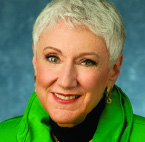Hadassah
President's Column
President’s Column: Preserving Freedom
 No two democracies are exactly alike. Each has its own quirks and none gets everything right. Seeing America and Israel conduct elections over the past few months I have lost count of the number of people I heard on both sides of the ocean who complained about their own system’s flaws.
No two democracies are exactly alike. Each has its own quirks and none gets everything right. Seeing America and Israel conduct elections over the past few months I have lost count of the number of people I heard on both sides of the ocean who complained about their own system’s flaws.But taking imperfections as a given, a couple of things I observed in these two recent elections stand out: First, for all their differences, Israeli and American democracy have much more in common than they have differences. Second, the best way to strengthen democracy in any nation is to constantly remind ourselves of what human existence is like without it—not only by looking at autocratic and dictatorial regimes today, but also recalling our own history.
Which brings me to Passover. Perhaps more than any other holiday, the Festival of Freedom has kept the Jewish people alive. This is the holiday that celebrates our relationship with God, our liberation from slavery and our birth as a nation. But how is it that four millennia after our forebears left Egypt, we still remember their journey?
It’s because of the tradition of not only telling the story every year at the Passover table, but also taking seriously the responsibility of imagining ourselves as having made the same journey. To a large extent, the Jewish people are free today, and Israel a vibrant nation, because we have built our defining holiday around remembering both the meaning of freedom and its opposite.
The line between the Exodus and the American Declaration of Independence may not be straight, but it is clear that both the Founding Fathers and millions of Americans today identify with the birth of Jewish nationhood—in the Passover story and in modern times. From foreign domination to the liberation of slaves, from freedom of religion to the motto from Leviticus inscribed on the Liberty Bell—“Proclaim freedom throughout the land, and to all the inhabitants thereof”—much of the Jewish experience echoes in America’s history.
One of the rights not written into the Constitution is freedom of movement, which is a constant theme in Jewish history. From confinement in ghettos to the denial of exit visas, tyrants have tried to control us and eradicate Judaism. Our liberation from Egypt began with a long journey, yet it strikes me that today many Jews travel much farther to be with their families on Passover than did our ancestors in crossing the Sinai desert.
Likewise, we view as miraculous the journey through the parted waters of the Red Sea, yet what would our forebears think of the way we travel to modern Israel, flying over the oceans and continents?
America, too, was built on movement, from the immigrants crossing the seas, to the expansion across a continent to the conquest of the skies. The freedom to choose where and how far we travel has been essential to our survival.
As we sit around the Seder table this year, perhaps with family members who have traveled long distances to be with us, we may not necessarily think of all the implications of our gathering. But by following our tradition we are not only passing our heritage on to the next generation, we are helping to preserve freedom itself.
For many people who live in democratic nations, the denial of liberty is still within memory. But as time passes, will the appreciation of the meaning of freedom falter? Not if free people preserve traditions similar to what we find in the Passover Haggada.
Ronald Reagan said that freedom is never more than one generation away from extinction. The further into our past we have to dig for the absence of freedom, the more we have to rely on education and memory.
A joyous and free Passover to you all.










 Facebook
Facebook Instagram
Instagram Twitter
Twitter
Leave a Reply